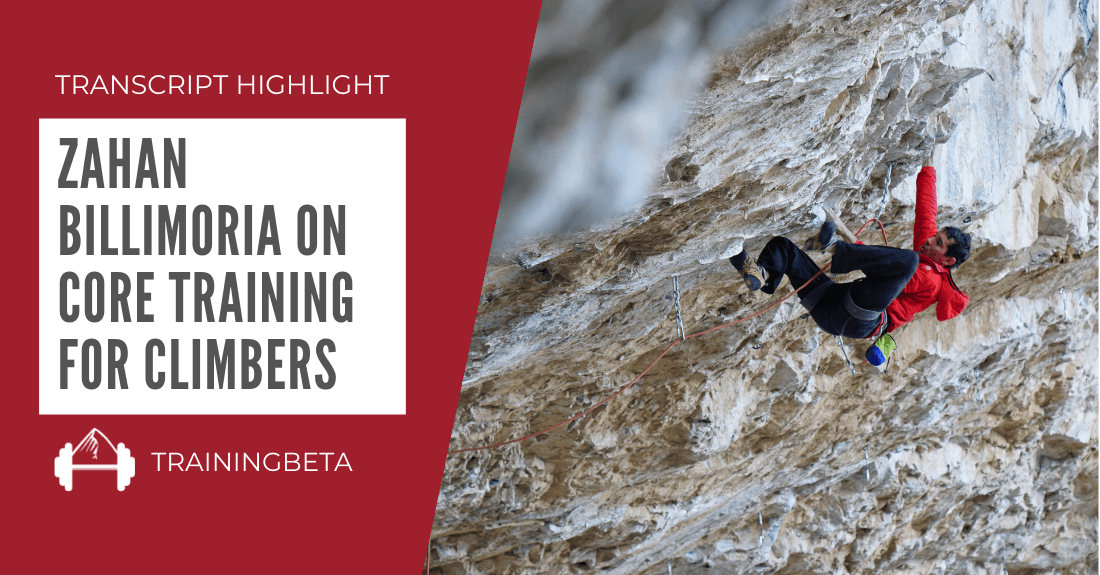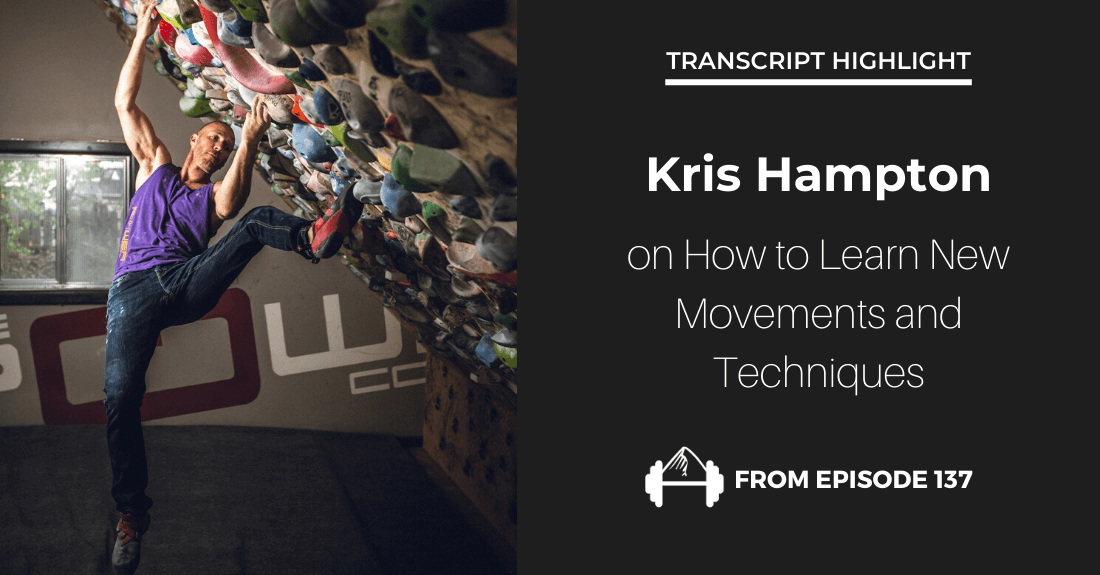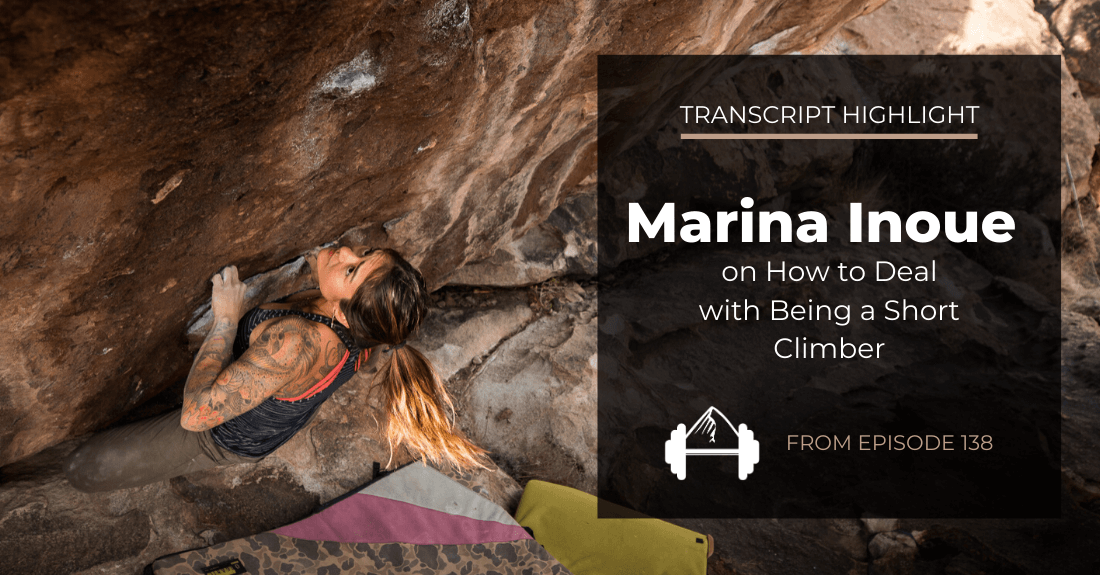For those of you who would rather read than listen, today we have an excerpt from the transcript of the TrainingBeta Podcast Episode 143: Sports Psychologist Dr. Chris Heilman Does A Session with Neely. You can find the entire transcript and audio on the episode page. In the interview, Neely talks to Dr. Chris about how she works with people as a Sports Psychologist and what kinds of issues she commonly helps people with. Then Chris and Neely do a session together, catch up on where she’s at with her climbing, and what she needs to work on moving forward.
In this excerpt, Neely has Dr. Chris introduce herself and outline the process she would take a client through with mental performance coaching. She also describes the kinds of changes people typically notice in their lives or in their sports performance after working with her.
Just as climbing is a skill sport that takes practice, the psychological side of our performance is also a skill that takes practice. Working with a Sports Psychologist can help you learn to understand your mind’s capabilities and strengthen its abilities for success!
If you are interested in improving your mental performance, Dr. Chris Heilman has worked as a Sports Psychologist for the last 20 years. She uses cutting-edge science and skills to empower hundreds of weekend warriors, youth, recreational, collegiate, and elite athletes to go beyond their limitations to achieve peak levels of physical, mental and lifestyle performance. To find out more information or book a session with Dr. Chris, check out her page on our website.
Lastly, be sure to check out the full episode or transcript! If you’re interested in training for climbing, check out our brand new Bouldering Program, or our Route Climbing and Finger Strength programs.
7:43
Neely Quinn: Why don’t you tell me a little about how you work with people? I know the answer to this because we’ve worked together, you as my sports psychologist, but tell me what kinds of things you are working on with people.
Doctor Chris Heilman: When I first meet someone I have them fill out an assessment. That assessment is your overall health, your satisfaction with your health and well being, and it also assesses your sports mindset. I have something called the Performance Pie which is broken down to different mental categories like coping with diversity, being under pressure, confidence, goal setting, as well as looking at your life stress and just your disposition towards sport. Do you have more of a task orientation or more of an ego orientation? What that means is with a task, you focus more on improving. With mastery and ego you maybe more focus on the outcome or the trophy or the award.
The first step is having you fill that out and then listening to your story, like who are you? Where did you come from? How did you get into this sport we call climbing? Why do you like a high gravity sport like that in the first place?
It might be your story but I find it really fascinating because it helps me connect the dots that you might not see. It’s your belief systems and your upbringing and it’s just your world but I can see it in a different light.
Then we go into your goals. What are your goals? What I do is I ask a lot of questions. I’m committed to my clients and I think they are part of my family members when I bring them on. I want that commitment as well. We talk and ask questions and I will dig a little bit.
What I expect or what I like to think about is that they’re taking a driver’s education course. They’re in driver’s seat. If you’re driving the car you have to do the work. I’m in the driver’s ed seat and I’m not going to let you fall off the road or get in a fender bender. I’ll guide you but you’ve got to be able to do the work. The clients that are the most committed get the most out of it. The ones that are just like, ‘Just give me the workout or give me the tools,’ and they’re not willing to dig deep? It’s usually not a good outcome. You have to be ready to be on board.
After we have a conversation it’s really two things I feel like I do. One is awareness and two is action. It’s asking these questions and helping you to come up with some answers as well as bringing in the science and the theory and the skills that I know for you to have all the moments and connect the dots. That’s the awareness piece.
Once you’re aware it’s like: how do you take action? How do you upgrade your systems of living? If you have an app, like this old system of belief, how do I upgrade it to something new? It’s really about taking action and having new skills to have a new frame of mind.
Neely Quinn: What kinds of changes do people typically notice in their lives or in their sports performance?
Doctor Chris Heilman: I would say people come for a variety of reasons. Some people might say they feel more calm, some might say they feel more in control, or I’d say more so that you can navigate those emotions or thoughts versus being ‘in control.’ More confidence, they can get their goals, just more lighthearted in general, they’re enjoying and having more fun. That’s a huge one. ‘I lost my enjoyment for the sport because I was so driven and so focused on outcomes that I forgot why I enjoyed it.’ Those are just a few off the top of my head.
Neely Quinn: In working with you myself I know it’s not like you have one ‘Aha!’ moment and then everything changes. It seems like a cumulative effect of just being able to talk to somebody about these things, like the inner workings of your mind during your sport and around your sport, but then also having several ‘Aha!’ moments and then going out and playing with that when you’re out climbing and doing whatever.
Then, things for me started to change where I was like, ‘Oh, I feel calmer. I’m being able to just be calm and relax and climb and have fun and see more positivity,’ and all these different things. It seems like working with you over a good amount of time is helpful.
Doctor Chris Heilman: Yeah, definitely. It’s something called latent potential, so you have these ‘Aha!’ moments but it might not be this immediate thing where now you know what to do. It takes practice, just like climbing. It’s a skill. The things that you’ve had that you’re trying to break through? They’ve been there for a long time.
I like to think of those habits like the Grand Canyon and the Colorado River. Those things are deep and they go fast and now you’re trying to change that habit and it becomes a trickle on the hillside. That’s that new neural pathway that you’re working on and so it’s like, ‘Oh right!’ These ‘Aha!’ moments are just catching yourself riding the Colorado River in the Grand Canyon and being like, ‘Oh, that’s not where I want to be. I want to change my habit,’ and just continually doing that over time.
Neely Quinn: Right. There are tons of things that we could talk about, like we could go through case studies and in talking about this interview before we are doing this right now you and I came up with the idea of doing sort of a mini session with me. I’ll be the guinea pig here just so that people can understand how things actually work in a session, how deep you might go, what kinds of things will come out, and the actions – so the homework – that you give at the end of each session. That is something that you do. You give an email that says, “This is a summary of our conversation and here are the things that I want you to look at until our next talk.”
FULL EPISODE/TRANSCRIPT:: TBP 143: Sports Psychologist Does A Session with Neely
Dr. Chris Heilman Links
- Work with Dr. Chris: TrainingBeta.com/Mindset
- Chris Heilman’s website: www.mindset-coach.com
- Chris Heilman’s instagram: @mindsetdr
- Her book: Elevate Your Excellence
- Sam Elias’s article describing his experience working with Dr. Chris
Please Review The Podcast on iTunes!
Please give the podcast an honest review on iTunes here to help the show reach more curious climbers around the world 😉
Other Articles You Might Like:
- Developing Mindful Eating Habits for Climbers
- How to Work With Our Inner Critic
- Improving Your Mental Fitness for Climbing
- Rock-Life Balance: The Climbing Wheel of Life
- 5 Tips to Increase Motivation






Leave A Comment